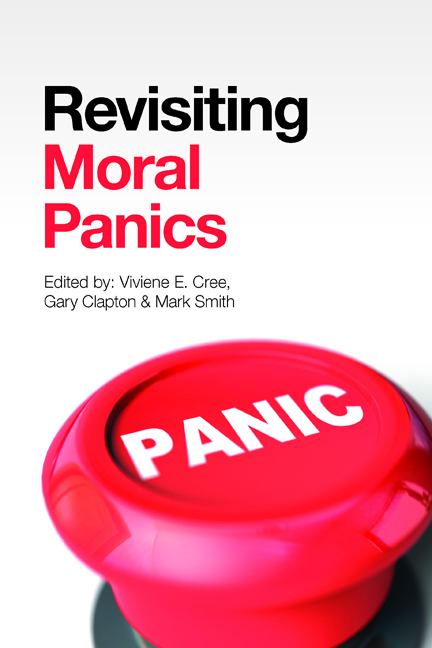Book contents
- Frontmatter
- Contents
- Contributors
- Preface
- Commentary moral panics yesterday, today and tomorrow
- Part One Gender and the family
- Part Two Moral panics in our time? Childhood and youth
- Part Three The state, government and citizens
- Part Four Moral crusades, moral regulation and morality
- Afterword the moral in moral panics
- Conclusion Moral panics and beyond
- Index
Sixteen - The moral crusade against paedophilia
Published online by Cambridge University Press: 08 March 2022
- Frontmatter
- Contents
- Contributors
- Preface
- Commentary moral panics yesterday, today and tomorrow
- Part One Gender and the family
- Part Two Moral panics in our time? Childhood and youth
- Part Three The state, government and citizens
- Part Four Moral crusades, moral regulation and morality
- Afterword the moral in moral panics
- Conclusion Moral panics and beyond
- Index
Summary
Introduction
The focus of this essay is the transformation of the threat of paedophilia into a permanent focus of moral outrage. It explores the moral landscape that has turned the child predator into the principal target of moral enterprise. Through a discussion of the concept of a moral crusade it evaluates the impact of society's obsessive preoccupation with the child predator.
Paedophilia and the threat it represents to children has become a permanent feature of public concern and a regular theme of popular culture. The paedophile personifies evil in 21st-century society; the child predator possesses the stand-alone status of the embodiment of malevolence. But this unique personification of evil is not an isolated figure hovering on the margins of 21st-century society. Jimmy Savile, who died in 2011 and who has not been out of the news during the past two years, was dubbed the most ‘prolific’ paedophile in British history. What is unique about the activities of this alleged celebrity predator is the scale of his operation rather than his behaviour. Allegations against Savile effortlessly acquired the status of a cultural truth, since it is widely believed that, rather than rare, the abuse of children is a very common activity.
According to the cultural script of virtually every western society, child abusers are ubiquitous. This script invites the public to regard all strangers – particularly men – as potential child molesters. The concept of ‘stranger danger’ and the campaigns that promote it have as their explicit objective the educating of children to mistrust adults that they do not know. This narrative of stranger danger helps to turn what ought to be the unthinkable into an omnipresent threat that preys on our imagination. Represented as a universal threat, the peril of paedophilia demands perpetual vigilance. The expectation that adult strangers represent a risk to children has in effect turned concern about paedophilia into a very normal feature of life. That is why physical contact between adults and children has become so intensely scrutinised and policed.
- Type
- Chapter
- Information
- Revisiting Moral Panics , pp. 201 - 210Publisher: Bristol University PressPrint publication year: 2015



